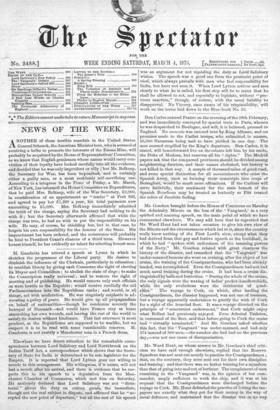Elsewhere we have drawn attention to the remarkable corre- spondence
between Lord Salisbury and Lord Northbrook on the Indian Tariff Act, a correspondence which shows that the Secre- tary of State for India is determined to be sole legislator for the Empire. It is reported that Lord Lytton goes out willing to accede to this arrangement. His willingness, if it exists, will not last a month after his arrival, and there is evidence that he sus- pects this in his speech to a deputation from the Man- chester Chamber of Commerce, which met him on Saturday. He anxiously declared that Lord Salisbury was not " dicta- torial " about the duty on cotton goods, the immediate, though not the real subject in dispute, and affirmed that he "ac- cepted the new point of departure," but all the rest of his speech
was an argument for not repealing the duty as Lord Salisbury wishes. The speech was a good one from the pessimist point of view, which always prevails with men who feel responsibility for India, but have not seen it. When Lord Lytton arrives and sees clearly to what he is called, his first step will be to insist that he shall be allowed to act, and especially to legislate, without " pre- vious sanction," though, of course, with the usual liability to disapproval. No Viceroy, once aware of his responsibility, will work on the terms laid down in the Blue-book No. 56.


































